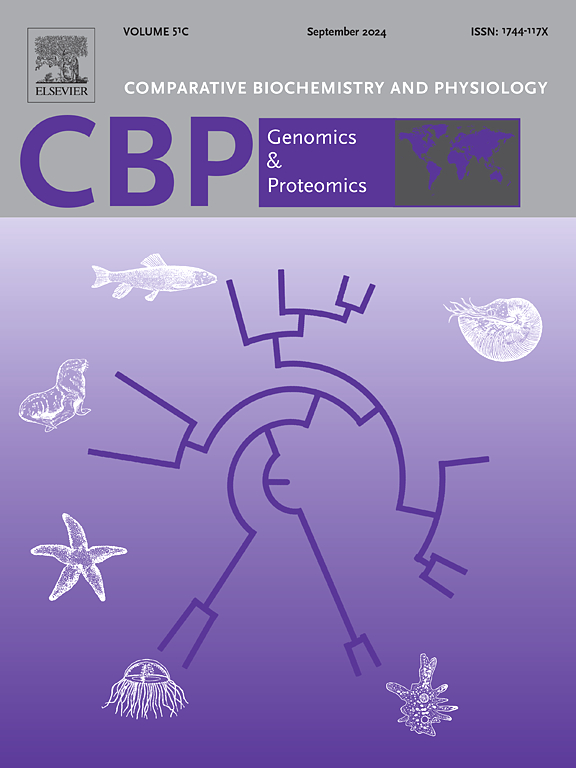The influence of sex on the intestinal flora of Procypris mera
IF 2.2
2区 生物学
Q4 BIOCHEMISTRY & MOLECULAR BIOLOGY
Comparative Biochemistry and Physiology D-Genomics & Proteomics
Pub Date : 2025-03-03
DOI:10.1016/j.cbd.2025.101464
引用次数: 0
Abstract
Sex plays a significant role in the formation of gut microbiota in most fish species. Procypris mera, a freshwater fish of considerable economic value, has been the subject of limited research regarding sex differences in gut microbiota. This study employed 16S rRNA technology to analyze the gut microbiota of P. mera under identical breeding conditions. The analysis revealed that, despite no significant differences in overall diversity between different sexes in the same intestinal segment, there were significant sex-related differences in specific microbial phyla and genera. Specifically, Fusobacteriota showed significant differences in relative abundance in the hindgut of females and males. Similarly, Cetobacterium exhibited significant differences in relative abundance in the hindgut of females and males. Additionally, there were significant differences in the Shannon index between the foregut and hindgut in males, as well as significant differences in beta diversity among the foregut, midgut, and hindgut in males. These findings indicate that there are local differences in gut microbiota between different sexes in the same intestinal segment and between different intestinal segments in the same sex. This discovery not only helps to reveal the mechanisms by which sex affects the formation of gut microbiota in fish but also provides new insights and theoretical support for optimizing breeding conditions and improving fish health.

性别对青虾肠道菌群的影响
在大多数鱼类中,性别在肠道微生物群的形成中起着重要作用。mera原鲷是一种具有相当经济价值的淡水鱼,一直是关于肠道微生物群性别差异的有限研究的主题。本研究采用16S rRNA技术对相同饲养条件下mera p.s mera肠道菌群进行分析。分析表明,尽管在同一肠道段中,不同性别之间的总体多样性差异不显著,但在特定的微生物门和属上存在显著的性别相关差异。具体而言,雌性和雄性后肠中梭杆菌的相对丰度存在显著差异。同样,鲸杆菌在后肠中的相对丰度在雌性和雄性中表现出显著差异。此外,雄性前肠和后肠的Shannon指数存在显著差异,雄性前肠、中肠和后肠的β多样性也存在显著差异。这些结果表明,同一肠道段不同性别之间以及同一性别不同肠道段之间的肠道菌群存在局部差异。这一发现不仅有助于揭示性别影响鱼类肠道菌群形成的机制,而且为优化养殖条件和改善鱼类健康提供了新的见解和理论支持。
本文章由计算机程序翻译,如有差异,请以英文原文为准。
求助全文
约1分钟内获得全文
求助全文
来源期刊
CiteScore
5.10
自引率
3.30%
发文量
69
审稿时长
33 days
期刊介绍:
Comparative Biochemistry & Physiology (CBP) publishes papers in comparative, environmental and evolutionary physiology.
Part D: Genomics and Proteomics (CBPD), focuses on “omics” approaches to physiology, including comparative and functional genomics, metagenomics, transcriptomics, proteomics, metabolomics, and lipidomics. Most studies employ “omics” and/or system biology to test specific hypotheses about molecular and biochemical mechanisms underlying physiological responses to the environment. We encourage papers that address fundamental questions in comparative physiology and biochemistry rather than studies with a focus that is purely technical, methodological or descriptive in nature.

 求助内容:
求助内容: 应助结果提醒方式:
应助结果提醒方式:


